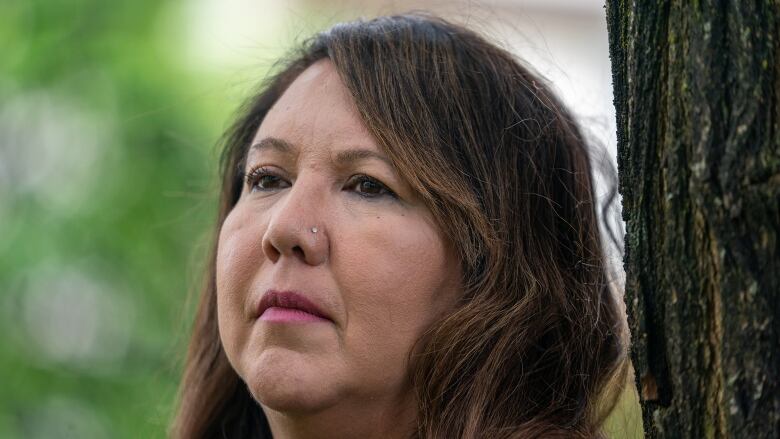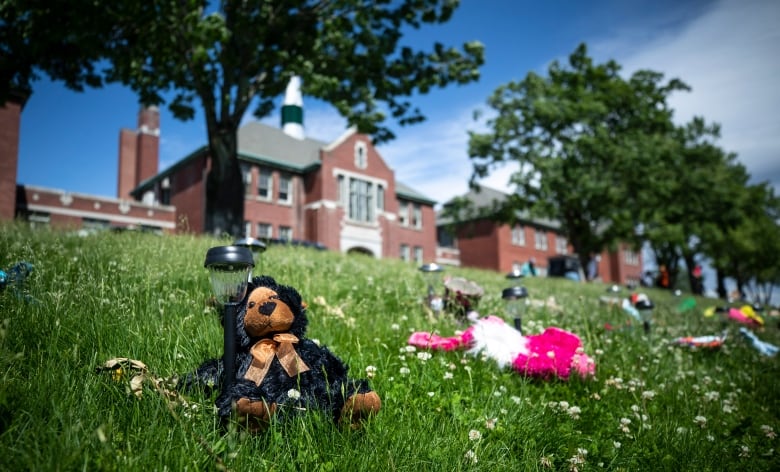Woman says her mother put her up for adoption to avoid Kamloops residential school
'That's a decision a mother shouldn't have to make,' Tina Taphouse says

WARNING: This story contains details some readers may find distressing.
Tina Taphouse has spent a lot of time lately reflecting on the impact the KamloopsIndian Residential School has had on her life's path.
Taphouse didn't go to the school because her mother, who worked there and had also grown up in residential school, made the impossible decision to put her up for adoption so she wouldn't have to attend.
The Tk'emlps te SecwpemcFirst Nation announced last month it had used the services of a ground-penetrating radar specialist to reveal what are believed to be the remains of children long believed missing from the school.
"When you have only the two choices to give me up for adoption to a better home and not go to residential school, or to keep me and raise me and to know that I would end up going to residential school that's a decision a mother shouldn't have to make,'' Taphouse said in an interview from her home in Langley, B.C.
"I'm not mad at her. I admire her strength and her decision.''
Taphouse said she's sharing her family's story so that her mother and other family members who went to the schools don't have to. Canada has a long way to go in addressing violence against Indigenous Peoples and it's important for people to understand the realities of what happened, she said.
Her mother is aware she is speaking with the media but did not want to be interviewed, she said.

Taphouse, who is Interior Salish from the St'at'imc community, was raised by non-Indigenous parents and now works as a photographer. She had a good upbringing, she said, but also understands the experience of the SixtiesScoop, when the federal government attempted to assimilate Indigenous children by placing them with non-Indigenous families.
"It was only in the last few months that I admitted to myself they [assimilation policies]were successful in me, that I often feel like I'm in the middle because I grew up in a non-Indigenous world,'' she said.
While she escaped the horrors that many survivors of the Sixties Scoop and residential schools endured, Taphouse said she also wasn't brought up in her culturewith her family or her traditions, and she felt lost.
She began reconnecting with her roots after her biological father contacted her through an adoption reunification registry in 1994. Over timeshe has learned more about her own family and story, although she said she doesn't push her mother to share sensitive details.
On Friday, she learned that her mother was referred to only by a number123when she was a child at St. Joseph's Mission outside of Williams Lake, B.C.
She knows her mother attended residential school until Grade 11 and then began working at theKamloopsIndian Residential School in 1964. She became pregnant with Taphouse three years later.
Taphouse has never asked how her mother ended up working at the residential school or about what happened there.
"I know it had to be horrific for her to shield me from it,'' she said.
Taphouse said she has taken strength from reconnecting with her Indigenous family, many of whom attended residential school. It's a family that helps one another in hard times and bands together to help out, she said.
"This community, my family, they've really opened up my eyes about giving and caring for others, not just for themselves,'' she said.

Among the most moving experiences has been seeing the way her family deals with death and connects with ancestors, she said.
"I feel it more every day, I feel them with me and beside me,'' she said.
"They give me the strength to talk and tell the world what we've known about for years, decades, generations. And to be a voice for those who can't talk right now, who are still hurting, who are still struggling.''
Support is available for anyone affected by their experience at residential schools, and those who are triggered by the latest reports.
The national Indian Residential School Crisis Line has been set up to provide support for former students and others. People can access emotional and crisis referral services by calling the 24-hour line: 1-866-925-4419.
With files from CBC's Angela Sterritt












_(720p).jpg)


 OFFICIAL HD MUSIC VIDEO.jpg)
.jpg)



























































































